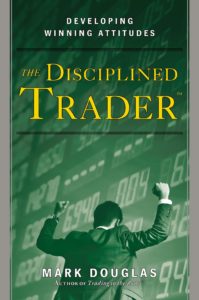 I am not and never will be a “trader,” in the sense of a full-time stock-picker/market-timer.
I am not and never will be a “trader,” in the sense of a full-time stock-picker/market-timer.
However, on the suggestion of my financial advisor, I recently ordered and read a copy of a classic trading book called The Disciplined Trader, by Mark Douglas (New York Institute of Finance, 1990).
Personally, my main interest in the topic involves hedging downside risk: taking actions that limit some downside, at the expense of some potential upside. What surprised me about this book — which bears the subtitle Developing Winning Attitudes — is how much space was allocated to psychology and mental attitudes. In fact, fully all of the third of the four major sections is devoted to what I would call “softer” topics like understanding the nature of the mental environment, how memories, associations and beliefs manage environmental information, managing mental energy and similar topics.
The market is always right
The preceding section (Part II: The Nature of the Trading Environment from a Psychological Perspective) is more in line with what a typical trader might expect to read. The chapter titles alone are helpfully descriptive: The Market is Always Right, There is Unlimited Potential for Profit and Loss, Prices are in Perpetual Motion with No Defined Beginning or Ending, The Market is an Unstructured Environment, and in the Market Environment, Reasons are Irrelevant.
While Douglas became a successful trader, the process was not without a steep learning curve and considerable pain. His initial attempts to learn to become a successful trader in the early 1980s ended in March 1982:
…by then it was all over. A mere eight months after moving to Chicago to pursue my dreams of financial independence, I had nothing left except my job, apartment, clothes, a television, and a bed.
Fortunately for readers, Douglas did not give up. As he says in the book flap, “Emotion kills successful trading.” He went on to become an expert on the mental dynamics of trading: hence the focus of the long Part III already described.
The 3 reasons traders are unsuccessful
Unsuccessful traders — that would be most of us! — fail for three main types of reasons, Douglas writes: lack of skills, limiting beliefs and lack of self-discipline. Typical trading errors include the refusal to define a loss, not liquidating a losing trade, believing you’re right and the market is wrong, revenge-trading (trying to get back at the market for what you believe it took away from you), not reversing a position even when you sense a change in market direction, and not following the rules of a trading system.
Needless to say, there are many skills to be required and until you do, I’d recycle the old quip not to try this at home, kids. Making money is a mere byproduct of the skills you acquire and if you think trading is easy, you definitely need to read this book before committing any significant amount of capital to the process. You need to establish your risk comfort level, learn how to structure your beliefs to control your perception of market movements, learn to maintain a state of objectivity and how to consistently act on intuitive information.
A tall order? Undoubtedly. That’s why Douglas stresses the need to build a framework to understand ourselves first. Our very fears can create the circumstances we were seeking to avoid. As he writes at one point, “all traders give themselves exactly what they deserve.” Traders have to learn how to manage their mental energy. Once they do, they will gain a sense of security and confidence, raise their satisfaction levels, become more intuitive and yes, increase their wisdom.
To get there will require mastering various techniques for effecting change, which is the focus of Chapter 14. You will have to direct a conscious shift in belief systems. Douglas provides several short exercises which challenge the prospective trader to identify their beliefs and any conflicting beliefs. (Typical is the juxtaposition of “I believe working is the honest way of making money./I believe trading is easy money, not work.”
As a writer himself, Douglas believes in the value of writing as an effective technique to effect change. Self hypnosis and repeating positive affirmations can also help.
All in all, a unique perspective on a discipline that the average investor probably knows little about. I have my doubts about how many investors are suited to this approach — very few, I’d wager — but even if you come away with a greater appreciation for the huge psychological cost the average trader pays for his/her success then it’s a worthwhile read.


